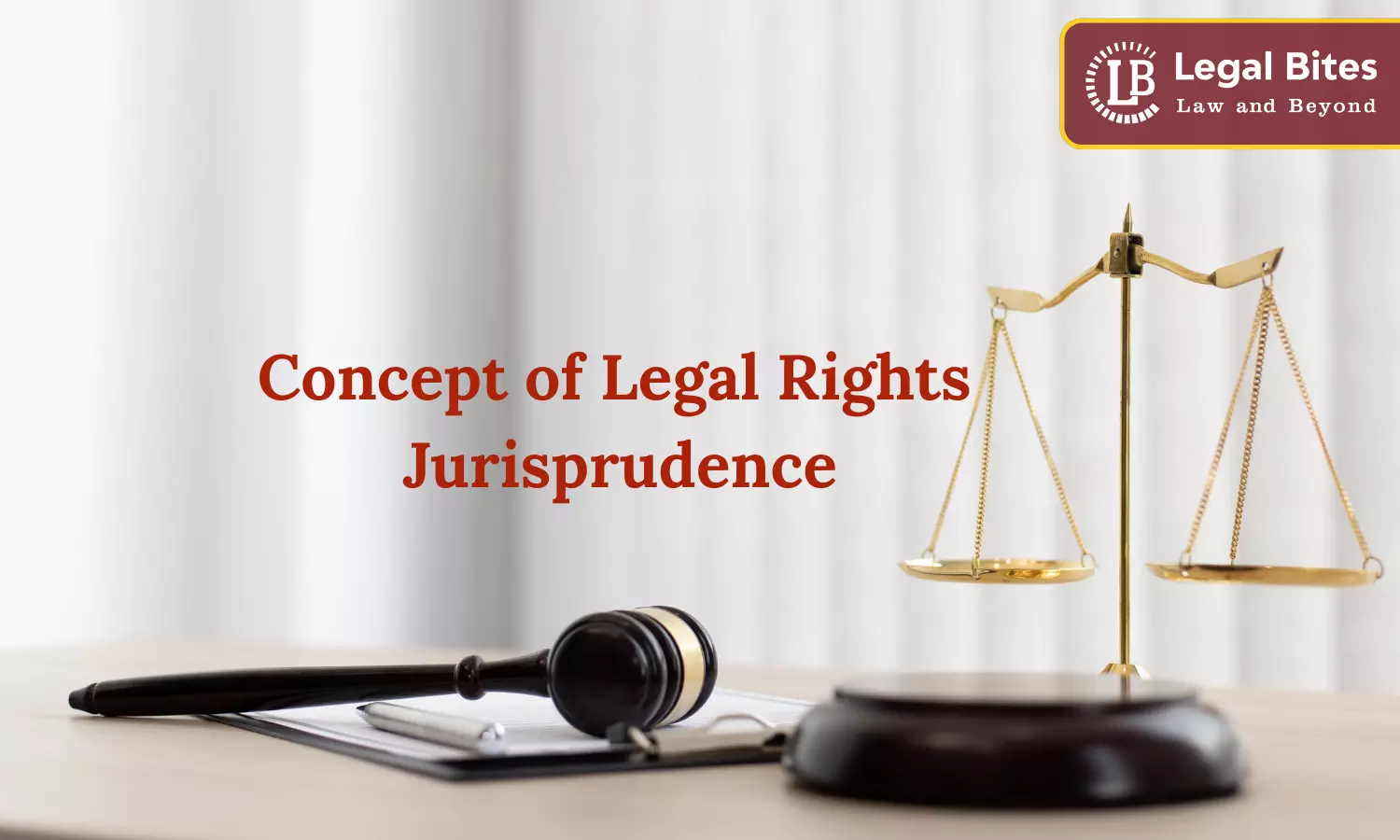Concept of Legal Rights under Jurisprudence
Understand the concept of legal rights through its definitions, various classifications, and its crucial role in ensuring justice and legal order.

Legal rights form the backbone of any legal system. They are the instruments through which individuals assert their claims and participate in legal processes. In jurisprudence, legal rights are not merely claims or moral entitlements; they are recognised, protected, and enforced by law. Various jurists—both classical and modern—have contributed to our understanding of what constitutes a legal right, its essential elements, and its classification. The concept bridges legal philosophy and practical law, making it crucial in understanding duties, liabilities, and entitlements in a civilised society.
Meaning of Legal Rights
A legal right, in its simplest form, can be defined as an interest recognised and protected by a legal rule. It imposes a corresponding duty on others and allows its holder to take legal action in case of violation.
H.L.A. Hart defines a legal right as the "permissive use of the law" that gives the right-holder the ability to make claims or demand remedies through legal institutions.
Holland, a classical jurist, describes legal rights as "a capacity residing in one man of controlling, with the assent and assistance of the State, the actions of others."
Characteristics of Legal Rights
- Recognized by Law: Legal rights must be acknowledged and enforceable through a legal system.
- Enforceable: A legal right can be enforced by the courts or other competent authorities.
- Corresponding Duty: Every legal right corresponds to a duty imposed on another person or group.
- Relational: Legal rights usually involve at least two parties—the right-holder and the duty-bearer.
- Legal Sanction: Violation of a legal right invites legal consequences or sanctions.
- Protected Interest: The right safeguards a lawful interest of an individual or group.
Essential Elements of a Legal Right
According to Salmond, every legal right has five elements:
- The Subject: The person who holds the right.
- The Object: The thing or person over which the right is exercised.
- The Act or Forbearance: The action that the duty-bearer must perform or avoid.
- The Person Bound: The one who has a corresponding duty.
- The Sanction: The legal mechanism that ensures enforcement.
For example, in a contract, the buyer has a legal right to delivery of goods, and the seller has a corresponding duty to deliver.
Theories of Legal Rights
1. Will Theory
- Propounded by Immanuel Kant and supported by Hegel, this theory holds that rights are instruments of individual freedom.
- The central idea is that a right is the expression of human will; it allows the individual to control others' conduct within the boundaries of law.
- Criticism: It excludes minors or mentally ill persons from holding rights, as they are considered incapable of forming will.
2. Interest Theory
- Supported by Rudolf von Jhering and Roscoe Pound.
- It posits that a right exists to protect a person’s interest, whether or not the person can exercise will.
- It includes infants and incapacitated persons within its framework, making it more inclusive.
- Criticism: It is often vague and fails to distinguish legal rights from moral interests.
3. Hohfeld’s Analysis of Legal Rights
| Right Type | Correlative Duty | Example |
|---|---|---|
| Right (Claim) | Duty | Right to receive payment |
| Privilege (Liberty) | No-right | Freedom to speak |
| Power | Liability | Power to enter into contracts |
| Immunity | Disability | Protection from being sued |
Hohfeld’s framework emphasises that legal rights are not monolithic and must be analysed in relational terms.
Classification of Legal Rights
Legal rights can be categorised in multiple ways:
1. Perfect and Imperfect Rights
Perfect Rights: These are legally enforceable (e.g., right to property).
Imperfect Rights: Not enforceable by law though legally recognized (e.g., certain obligations under international law).
2. Positive and Negative Rights
Positive Rights: Entitle the holder to something (e.g., right to education).
Negative Rights: Entitle the holder to non-interference (e.g., right to privacy).
3. Proprietary and Personal Rights
Proprietary Rights: Rights over property (e.g., ownership, lease).
Personal Rights: Rights against a person (e.g., contractual rights).
4. In Rem and In Personam
Rights in Rem: Rights enforceable against the world (e.g., ownership).
Rights in Personam: Rights enforceable against a specific person (e.g., debt recovery).
Legal Rights v. Moral Rights
| Basis | Legal Rights | Moral Rights |
|---|---|---|
| Enforceability | Enforced by courts | Not enforceable legally |
| Origin | Created by the State | Rooted in ethics or morality |
| Example | Right to education under Article 21-A | Right to be respected |
| Sanction | Legal penalties for breach | Social disapproval or guilt |
While moral rights may influence the development of legal rights, not all moral rights become part of the legal system.
Importance of Legal Rights in a Legal System
- Foundation of Rule of Law: Legal rights ensure governance by law and not by arbitrary power.
- Protection of Liberties: They guarantee freedom of speech, religion, and personal liberty.
- Balance in Society: Rights and duties help maintain equilibrium among competing interests.
- Development and Welfare: Rights such as education, health, and work enable human development.
Conclusion
Legal rights are not static. They evolve with society, legislation, and judicial interpretation. As jurisprudence continues to expand the scope of rights—from socio-economic entitlements to digital freedoms—the concept remains central to legal theory and practice. Understanding legal rights is indispensable for law students, legal professionals, and citizens alike, for they are the instruments that translate justice from principle to practice.
References
- P J Fitzgerald, Salmond on Jurisprudence (12th Edition)
- Significance Of Legal Right And Its Theories, Available Here
- Legal Rights – Definitions and Characteristics, Available Here
- Legal Rights, Available Here
Important Link
Law Library: Notes and Study Material for LLB, LLM, Judiciary, and Entrance Exams

